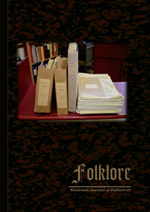Concepts Around Selected Pasts: On ‘Mnemonic Turn’ in Cultural Research
Concepts Around Selected Pasts: On ‘Mnemonic Turn’ in Cultural Research
Author(s): Ene KõresaarSubject(s): Customs / Folklore
Published by: Eesti Kirjandusmuuseum
Keywords: cultural heritage; history culture; memory turn; social and cultural memory; tradition
Summary/Abstract: The aim of this article is to outline the main concepts used in cultural research, which denote the use of the past, to look into the trajectories of their mutual relationships, and to discuss the causes and development potential of the multi-faceted landscape of concepts that has emerged. Serving as an introduction to this thematic volume, this article creates the necessary conceptual framework for reading the following case studies. Two pairs of concepts are observed, which provide information on the modern cultural research of selected pasts: history culture and memory, and tradition–heritage. It is concluded that all the observed concepts could in the current situation be dealt with not only as fields of research, but as perspectives relevant for all areas of cultural research. Whether and to what extent the research of history culture, memory, tradition and heritage are entangled, is dependent on problem settings and objects of research, to which the respective research directions were originally related, but also connected with disciplinary contexts and academic traditions in different countries. In addition to impulses arising from inside research directions, the reason for the greater engagement of these directions could be the rise of interdisciplinary fields, which are not anchored to any specific concepts. A situation in which cultural research concepts with solid trajectories become replaceable occurs also in the case of transdisciplinary ‘turns’. The research perspectives behind different concepts are best engaged within a specific field of research, which in turn have made way to the emergence of new concepts that bridge the established ones. In the context of this thematic volume, it is meaningful to refer to the increased cross-disciplinary interest in how the representation of the past in a variety of public spheres takes place. In this respect, concepts have been taken into use that refer to the ‘public’ at different levels: from official, state-sanctioned institutions to less formal, often locally based settings, and to particular, individualised contexts.
Journal: Folklore: Electronic Journal of Folklore
- Issue Year: 2014
- Issue No: 57
- Page Range: 7-28
- Page Count: 22
- Language: English

